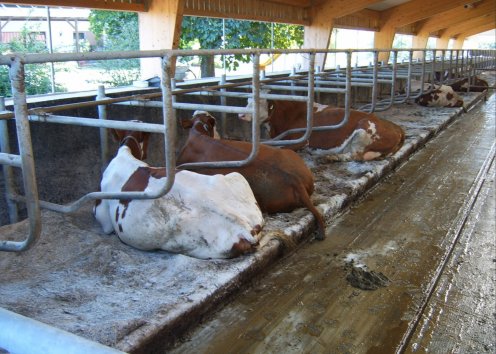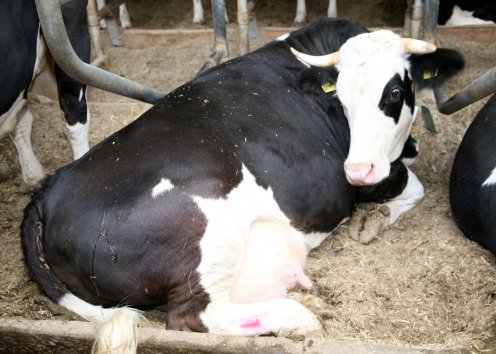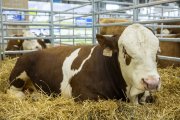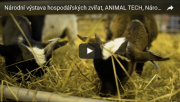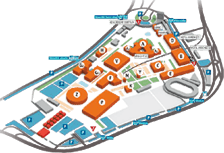DüKa Czech
Stable straw mattresses and use of KSM kalk alk.
What kind of bedding?
Bed requirements resp. Bedding is well known. The bedding must be reasonably soft, hygienically sound and dry. A suitable alternative is the straw mattress, which is expanding in the Czech Republic. It is a technology widely used in Germany. The technological process of mattress production consists in mixing straw with KSM kalk alkalisch and water in a feed wagon in a ratio of 1: 5: 2 (straw: KSM kalk: water). After layering into lying boxes (depth 18 -20 cm) and subsequent compaction with a vibrating plate or roller, a stable hygienic straw mattress is created. These stable mattresses in the box bed last for several years and regularly once every 14 days it is supplied with a mixture in the ratio 1: 2-3: 2 (straw: KSM calc: water). The advantage of KSM calc is the ability to create a permanent environment with PH> 10 and thus actively acts to reduce germs. Thanks to the soft bedding, dairy cows do not have bruised ankles or hoof problems. It is also possible to use a mixture of separate with DEKAMIX® for subsequent dosing.
DEKAMIX® is a light gray powder, the main components of which are exclusively natural raw materials. It has strong alkaline effects and is able to bind moisture. It is characterized by a significant reducing effect on pathogens. Due to a significant sudden increase in the pH value of 11, the spectrum of pathogenic germs is reduced under the pressure of external conditions. It reliably acts on members of the genus Pseudomonas, Klebsiella, pathogens such as Staphylococcus aureus and Streptococcus uberis. Application doses of Dekamix also have an effect on reducing the incidence of mastitis in dairy cows, followed by a reduction in the number of somatic cells, and last but not least, they also have a positive effect on the health of the hooves.
Optimal pH - area for pathogenic germs
Staphylococcus aureus: pH 4.2 - 9.3
Pseudomonas spp .: pH 5.6 - 8.0
Escherichia coli .: pH 4.4 - 9.0
Campylobacter spp .: pH 4.9 - 9.0
Bacillus cereus: pH 5.0 - 8.8
DEKAMIX® and KSM calc. it can be applied to deep bedding, boxes, but also to mattresses. When using Dekamix, it is possible to litter even smaller amounts of material, both straw and separate. Increasing the dry matter of the litter after application and changing the pH reaction have a positive effect on reducing the occurrence of pathogenic germs and significantly reducing the possibility of their multiplication. This also reduces the infectious pressure in the stable.
Thanks to the longer interval, the need for bedding is reduced and the amount of work is reduced. Thanks to the extremely high proportion of fine particles in Dekamix (100% of the particles are smaller than 0.06 mm), the risk of possible stratification in the waste channel is also eliminated.
DEKAMIX® is also used as a spreading material in manure and feed passages. Its regular use clearly increases the purity of the animals, and last but not least, the purity of the udder and teats. The effect of Dekamix on the hooves in the form of a so-called dry bath is unique.
Thanks to these properties, the spectrum of pathogenic germs, which contribute to the possibility of all bacterial diseases, is demonstrably reduced. It is successfully used in stables with dairy cows, calves, bulls in the gut but also in stables with pigs and poultry. Its application to the litter in the stable significantly affects the welfare of the animals, reduces the humidity in the stable and thus contributes to improving the stable climate.
Recommended application
Grate housing 1-2 times a week 200-300 g / m2
Bedding 1-2 times a week for wet places 100 - 200g / m2
Deep bedding 1-2 times a week for humid places 300 - 500 g / m2
Validation of Dekamix
| mammary gland pathogen detected in the milk used to contaminate the separate |
KTJ před |
KTJ 6 hours after application Dekamixu |
KTJ 12 hours after application Dekamixu |
KTJ 24 hours after application Dekamixu |
KTJ 48 hours after application Dekamixu |
| Streptococcus agalactiae |
55 | 22 | 24 | 20 | 8 |
|
Staphylococcus aureus |
228 | 133 | 56 | 56 | 40 |
| Staphylococcus PK - (delta hemolysin +) |
2345 | 1500 | 1500 | 1500 | 1100 |
| Staphylococcus PK- (delta hemolysin -) |
4050 | 3400 | 2200 | 2180 | 2260 |
|
Streptococcus dysgalactiae |
89 | 38 | 12 | 14 | 8 |
|
Streptococcus uberis |
88 | 43 | 24 | 4 | 0 |
Source: Veterinary Laboratory, VEDIA sro
ANIMAL TECH
For exhibitors
For Media
Partners
Concurently with
You might be interested in
Exhibitors 2021

